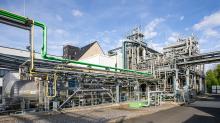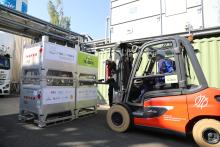We optimise and scale up advanced partial oxidation technologies for liquid and gaseous raw materials with CO2 integration as well as synthesis processes for the production of CO2-neutral synthetic fuels from methanol.
Research focus and context:
Synthesis gas production through high-pressure partial oxidation and the synthesis of high-quality fuels are important process stages of modern XtL routes. The EVT department operates a high-pressure synthesis gas plant (HP POX - High Pressure Partial Oxidation) for the gasification of liquid and gaseous hydrocarbons and a large-scale gasoline synthesis plant for the production of high-octane gasoline from synthesis gas (Syngas-To-Fuel - STF). The "Synthesis Gas Technologies" department is responsible for predicting, planning and analysing the test campaigns, which are carried out in cooperation with the Plant Operation department. In addition, the gasoline synthesis technology is being further developed in a small-scale pilot plant (STF+), which, with an extension currently under construction, will also enable investigations into methanol-to-jetfuel processes (methanol-to-olefins and olefins-to-oligomerates) in the future.
Tasks and research methods
R&D in the field of high-pressure partial oxidation:
- Gathering and evaluation of data from the operation of the HP-POX plant
- Substance and enthalpy balances, thermodynamic modelling of synthesis gas production
- Studies on the formation of trace substances that are important for further gas purification and utilisation, such as HCN, NH3, COS and organic acids
- Gasification optimisation for different feedstocks
R&D in the field of fuel syntheses:
- Obtaining and evaluating closed sets of experimental data from the operation of STF and STF+ plants
- Substance and enthalpy balances, thermodynamic modelling of fuel production
- Optimisation of operating parameters to improve fuel quality
- Overall system analysis
Contact
Dr.-Ing. Peter Seifert
Head of Department
+49 3731 39-4552
Peter [dot] Seifert@iec [dot] tu-freiberg [dot] de [at] iec [dot] tu-freiberg [dot] de (Peter[dot]Seifert[at]iec[dot]tu-freiberg[dot]de)
M.Sc. Malena Peuker
Deputy Head of Department
+49 3731 39-4577
Malena [dot] Peuker@iec [dot] tu-freiberg [dot] de [at] iec [dot] tu-freiberg [dot] de (Malena[dot]Peuker[at]iec[dot]tu-freiberg[dot]de)

